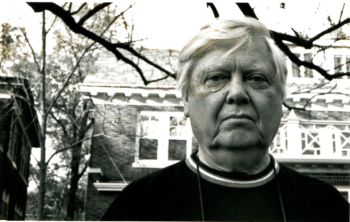
A Virtuoso Performance: Speakers from the 2016 William H. Gass Symposium, Part I
Speakers from the 2016 William H. Gass Symposium, Part I
The Modern Literature Collection is beginning to process some wonderful video footage from the September 23rd William H. Gass Symposium, an event that examined Gass’s literary work in translation, the importance of his work as a literary critic, and his role in promoting international writing.

In this three-part series, we are pleased to present the papers, remarks, and readings from the writers, professors, and scholars who have been inspired by Gass’s work in literature, translation, and academia.
In the first part, we feature talks by Lynn Tatlock, Matthias Göritz, and Ignacio Infante.
Hortense & Tobias Lewin Distinguished Professor Lynne Tatlock graciously welcomed visitors to the symposium with an anecdote on her initial acquaintance with Gass as a child living in Lafayette, Indiana, when Gass was still teaching at Purdue University and had recently published In the Heart of the Heart of the Country. Tatlock pointed out that William Gass was known for the remarkable introductory speeches he gave honoring the work of fellow writers–his “occasional words” often became a “virtuoso performance.”
Novelist and William H. Gass Fellow Matthias Göritz followed with a paper addressing the importance of literary translation, referring to untranslated fiction, poetry, and essays as “the literary undead” waiting to be “brought back to life” by a translator.
Göritz explained, “Translation becomes a very complex and personal task where the mind of the author meets the mind of the translator, as a reader and as an author of the translation. A text has to be created twice, in the original text by the writer and reader, and in the translation by writer and translator, transreader.”
Associate Professor of Comparative Literature Ignacio Infante followed with a close reading of Gass’s essay of transreading, examining the “poetics of translation and re-translation” and the particularities of “reading across languages.” “A successful transreading,” he stressed, “asks the right questions of the text.”
Stay tuned for more posts with materials from the 2016 William H. Gass Symposium! In the meantime, please explore the Modern Literature Collection digital exhibit on William H. Gass, The Soul Inside the Sentence.